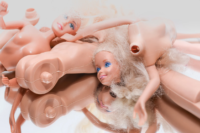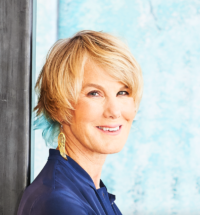
A plastic free Barbie shouldn't be a dream
The toy that first gripped girls’ imaginations in 1959 has re-entered public consciousness by storm, with the Barbie film grossing $1bn USD at box offices in just two weeks. Not since Aqua released their iconic song in 1997 have more people – children and adults alike – declared themselves Barbie girls in a Barbie World.
But in the intervening 25 years, the second line of Aqua’s catchy anthem, “life in plastic; it’s fantastic” has become as out of step with modern attitudes as an Enid Blyton story.
And so it is that Daryl Hannah and Yes Men launched an elaborate – and rather brilliant – hoax this month, to highlight the problem with our blonde friend. They convinced news outlets around the world that Mattel had committed to making Barbie completely plastic free by 2030. The article was published as fact in The Washington Times and People Magazine, quoting Mattel’s CEO Ynon Kreiz saying “We have made more than a billion plastic barbies, and enough is enough.”
Mattel rushed to put the record straight, claiming they were ‘bewildered’ by the stunt. What an opportunity missed. Imagine if instead, they had put out a call to creatives and material innovators globally, asking them for ideas to make this hoax a reality. Because the truth is that a plastic-free Barbie is perfectly possible today. It is not some idealistic dream. Every child buying a Barbie or a Ken deserves something better.
Of course, Mattel is not alone in continuing to use plastic as the default for their toys. In one generation, we have seen a huge shift from natural to synthetic materials for most products that populate a child’s playroom. Plastic, derived from fossil fuels, is an extraordinary material. But the chemicals used in its production, 13,000 at the latest count, are considered by scientists globally to be a risk to health.
Barbie bodies, heads, limbs, and accessories are typically made from polyvinyl chloride (PVC) or acrylonitrile-butadiene-styrene (ABS) plastics. Phthalates within these materials have the potential to harm children's health and development by interfering with natural hormone functioning. They have been linked to birth defects in baby boys, testicular cancer, liver problems, and early onset of puberty in girls – which is a risk factor for later-life breast cancer.
Data now shows that no one, anywhere, can escape from exposure to plastics particles and plastic chemicals. They have become so ubiquitous and pervasive globally at levels harmful to most, if not all, biodiversity, including human beings.
Meanwhile, when plastic ends up in the environment, it tends to bind with other pollutants. With plastic that moves through the food chain, the attached toxins can also move and accumulate in animal fat and tissue through a process called bioaccumulation. The bioaccumulation of toxins represents one of the most startling impacts of the plastics crisis. But it is a concept that is barely understood or reported on.
Fortunately, the EU is stepping up with strong direction on single-use materials and toxic chemicals. Our best hope for business certainty is the UN Global Plastics Treaty, currently under negotiation with 190 member states, many of which are pushing for a High Ambition Treaty that will be finalised by end of 2024, record time for a legally binding agreement.

At Plastic Free, we are helping designers every day to connect with the innovators and the hundreds of scaled, market-ready new materials that can replace plastic for good. It is already possible to make dolls from alternative materials based on cellulose, plant protein, seaweed, algae, mycelium, and other abundant natural toxic free materials.
Such materials, so long as they retain their nutrient qualities, can then break down in any environment, and instead of polluting the seas and soil, they can actually return to Nature safely, ready to be the nutrient for the next stage of growth. This is Nature’s circular economy: waste-free and toxin-free.
So what needs to happen for the seismic shift to such materials? Imagine if the European Union announced that – as of 2030 – production and use of plastic would be outlawed across the continent. In the vacuum created, there would be a huge catalytic effect on innovation, with substantial investment in every company producing alternatives. And as alternatives scale up, the price of them would plummet.
Political pressure for the UK to follow with stringent regulation of its own would follow. The big manufacturers of plastic tat in China would have to switch materials in order to keep exporting. None of this need be a fantasy. We just need to want it.
And the result? We could stop treating our seas and waterways as sewers, our soil as landfills. We would reduce flood risk to an estimated 218 million people worldwide. Greenhouse gas emissions would abate as we wean ourselves off fossil-fuelled single use. We could finally transition from old economy to a post-plastic new economy; one of abundance not pollution.
As Aqua rightly sing, “Imagination, life is your creation”. Barbie has been a symbol for so much over the years. If Mattel really did step into a role of extraordinary and brilliant leadership, she could become a modern emblem of what’s possible and a call to action to governments around the world.
Barbie can be anything; she knows that. The very last thing she needs to be is plastic. So come on Mattel. Come on Barbie. Join the plastic free party!

Sian Sutherland is Co-Founder of A Plastic Planet and PlasticFree.













